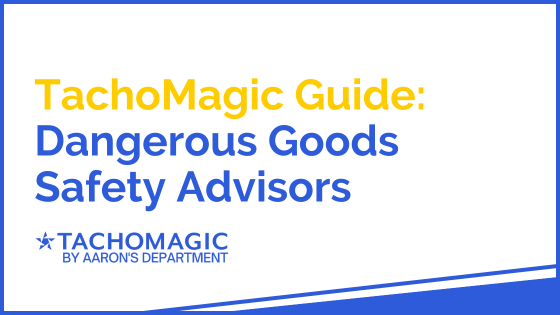In industries where hazardous materials are handled, ensuring safety isn't just a priority—it's a legal obligation. From chemical plants to transportation companies, the management of dangerous goods demands meticulous attention and expertise. This is where Dangerous Goods Safety Advisors (DGSAs) come into play.

What is a Dangerous Goods Safety Advisor?
A Dangerous Goods Safety Advisor, commonly referred to as a DGSA, is a certified professional, responsible for providing expert advice on the safe handling, storage, and transportation of hazardous materials. They act as a crucial link between regulatory authorities, companies, and individuals involved in the transport and handling of dangerous goods.
Key Responsibilities:
- Regulatory Compliance: Dangerous Goods Safety Advisors ensure that all activities involving dangerous goods adhere to the regulations and standards set by local, national, and international authorities. This includes understanding and implementing laws such as the ADR (European Agreement concerning the International Carriage of Dangerous Goods by Road), the IMDG Code (International Maritime Dangerous Goods Code), and the IATA Dangerous Goods Regulations (International Air Transport Association).
- Risk Assessment: Dangerous Goods Safety Advisors conduct risk assessments to identify potential hazards associated with the handling, storage, and transportation of dangerous goods. By evaluating factors such as chemical properties, packaging requirements, and transportation routes, they develop strategies to mitigate risks and enhance safety measures.
- Training and Education: Dangerous Goods Safety Advisors play a crucial role in educating personnel involved in the handling and transportation of dangerous goods. They develop training programs, conduct workshops, and provide guidance on proper handling techniques, emergency procedures, and regulatory compliance to ensure all stakeholders are well-informed and prepared to deal with potential risks effectively.
- Emergency Response Planning: In the event of accidents, spills, or other emergencies involving dangerous goods, DGSAs play a key role in developing and implementing emergency response plans. They coordinate with relevant authorities, such as emergency services and environmental agencies, to minimize the impact of incidents and ensure swift and effective response measures.
- Auditing and Inspections: DGSAs conduct regular audits and inspections of facilities, vehicles, and procedures to assess compliance with safety regulations and identify areas for improvement. By conducting thorough inspections and addressing any non-compliance issues promptly, they help maintain a high level of safety standards within the organisation.

Qualifications and Certification:
Becoming a Dangerous Goods Safety Advisor requires you to undertake written examinations. See the DGSA examination syllabus for further information on location, dates, costs and general advice for candidates and training providers.
There is no legal requirement to undertake formal training to become a DGSA. Training courses are run by independent providers and trade associations, with course lengths typically varying between 2 and 5 days. These courses do not need to be approved by the Department of Transport.
Conclusion: Understanding the Role of Dangerous Goods Safety Advisors
In industries where the handling of dangerous goods is a daily reality, the role of a Dangerous Goods Safety Advisor is indispensable. By providing expert guidance, ensuring regulatory compliance, and enhancing safety measures, DGSA's play a vital role in safeguarding both people and the environment from the potential risks associated with hazardous materials. Dedication to maintaining the highest standards of safety helps businesses operate responsibly and mitigate the inherent dangers posed by dangerous goods.
Further Reading
For further information on TachoMagic and the services we provide, including our Remote Automatic Download services, you can find out more below.

